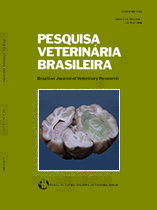 |
|
|
|
Year 2017 - Volume 37, Number 8
|

|
Transmissibility of Small Ruminants Lentivirus in kids by experimentally infected semen, 37(8):805-812
|
ABSTRACT.- Hasegawa M.Y., Lara M.C.C.S.H., Gaeta N.C., Marques J.A., Ribeiro B.L.M., Rossi R.S., Marques E.C. & Gregory L. 2017. [Transmissibility of Small Ruminants Lentivirus in kids by experimentally infected semen.] Transmissibilidade de Lentivírus de Pequenos Ruminantes para cabritos e cabras adultas por meio de sêmen infectado experimentalmente. Pesquisa Veterinária Brasileira 37(8):805-812. Departamento de Clínica Médica, Faculdade de Medicina Veterinária e Zootecnia, Universidade de São Paulo, Av. Prof. Dr. Orlando Marques de Paiva 87, São Paulo, SP 05508 270, Brazil. E-mail: lgregory@usp.br
Caprine Arthritis Encephalitis is a multisystemic infectious disease, caused by a lentivirus. The objective of this study was to evaluate the transmissibility of caprine lentivirus to goats and their offspring, through experimentally infected semen. Therefore, eleven free-CAEV goats were artificially inseminated using semen from a free-CAEV buck experimentally infected with CAEV-Cork strain (experimental group one). Pregnancy was confirmed in only six goats and their offspring (n=6) constituted the experimental group two. Two free-CAEV females were artificially inseminated with semen from the same seronegative buck, without viral inoculum to constitute the control group. The diagnosis of caprine lentivirus infection was performed using AGID, cELISA and nested-PCR. All females were monitored for 210 days after artificial insemination. Kids were immediately separated from their mothers after birth, and monitored at zero time, 15 days old and monthly until 12 months old. Regarding goat samples, 56.96% (9/159) were positive in cELISA, 24.05% (38/158) were positive in IDGA and none was positive in nested-PCR. Regarding to the offspring samples, 11.28% (15/133) and 5.26% (7/133) were positive in nested-PCR and IDGA, respectively, while no sample was positive in cELISA. The control group showed no positives in the three techniques. The positivity observed to nested-PCR may show its importance to identify infected, but seronegative animals, in late seroconversion situations. According to results, the transmission of caprine lentivirus to offspring and their mothers through infected semen is possible. |
| |
|
|
| |
|
 |